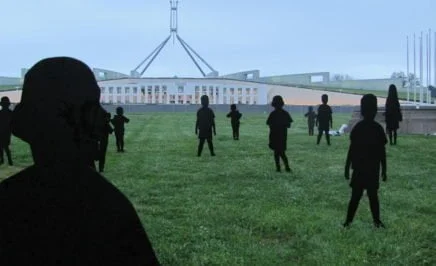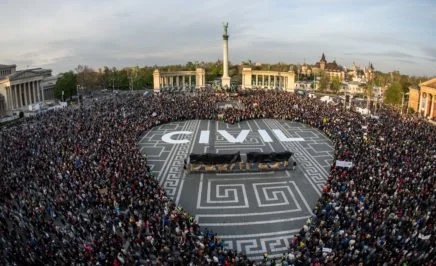Four million people have fled Syria since the conflict began in 2011 and at least 7.6 million people have been displaced with the country. Amnesty’s Sherif Elsayed-Ali looks at the people affected by the crisis.
Global challenge
In a satirical drawing to illustrate the global challenge posed by Syria’s growing refugee crisis, Ali Ferzat, a well-known Syrian cartoonist and opposition activist, depicts a small, slim figure carrying a miniature key confronted with an enormous, chunky padlock.
The image neatly captures the overwhelming disparity between one of the largest refugee crises in history and the grossly inadequate response of the international community.
In Syria, the statistics speak for themselves. The bloody conflict has displaced at least 7.6 million people within the country. Around four million have fled abroad as refugees – 95 percent of them currently live in Turkey, Lebanon, Jordan, Iraq, and Egypt.
The bloody conflict has displaced at least 7.6 million people within the country. Around four million have fled abroad as refugees – 95 percent of them currently live in Turkey, Lebanon, Jordan, Iraq, and Egypt.
At least 380,000 of the refugees in those countries have been identified by the UN refugee agency as in urgent need of resettlement in other countries where they can restart their lives with the support they need. They include vulnerable people who have survived rape and torture, unaccompanied children, and those unable to access the medical care they desperately need.
People behind the numbers
With a tragedy of this scale, we can easily forget the people behind the numbers, it is best to read a refugee’s own words. Nadia, a 47-year-old Syrian woman, fled to Jordan alone with her son; her husband died 10 years ago.
She told Amnesty International:
“We left Homs because of the conflict. It is not safe there. I couldn’t send my son to school. I was very afraid. The sound of bombs made my son very afraid. I was afraid for my son so I took him and came to Jordan. My brother was working in Jordan and helped me come [to Jordan] but he died of cancer… Life in Syria was lovely. We had a beautiful house.
“It is not safe there. I couldn’t send my son to school. I was very afraid. The sound of bombs made my son very afraid.”Nadia, a Syrian refugee and mother
“It is very expensive here. I can’t even afford to pay for electricity. It’s a very poor living… Sometimes I don’t even have the money for him to take a bus [to school] so he stays at home. We are very poor. Sometimes we don’t have anything to eat.
“I wish to go to another country because they will help me with my future and my son’s future. I will go to any place. I want to go somewhere where I will not have to rely on handouts at all. I am crying for my old life where I had dignity. I have to beg all the time. I want to leave for the future of my son. He has no friends and no life.”
“I am crying for my old life where I had dignity. I have to beg all the time. I want to leave for the future of my son. He has no friends and no life.” Nadia
The statistics also speak for themselves across the rest of the world.
Turning backs on Syrian refugees
From Asia to Europe, large wealthy countries have turned their backs on Syrian refugees. All six Gulf countries, Russia and Japan have not offered to resettle a single refugee. The numbers for several EU countries are paltry – at best an attempt to save face: 140 for Denmark, 130 for Spain and 90 so far for the UK.
In many countries, political leaders have allowed fears over rising immigration levels to overshadow humanitarian considerations. With very few exceptions like Germany, which is resettling 30,000 Syrian refugees, the general response has been shameful.
Overall less than one-fifth of the resettlement places that are needed have been offered by the international community. The vast majority of Syrian refugees in need have been left out in the cold.
Overall less than one-fifth of the resettlement places that are needed have been offered by the international community. The vast majority of Syrian refugees in need have been left out in the cold.
The conflict in Syria has played out on our TV screens, in newspapers and online for nearly four years now. This is a crisis we cannot afford to ignore. In the face of such tragedy, we may at times be overwhelmed, but there is something we can do.
Nadia, her son, and the rest of the 380,000 refugees who need resettlement are waiting for a new home, and hope, in other countries. There has never been a more important time for the world to show that it is open to Syria’s refugees.
This op-ed was originally published by Al Jazeera.




